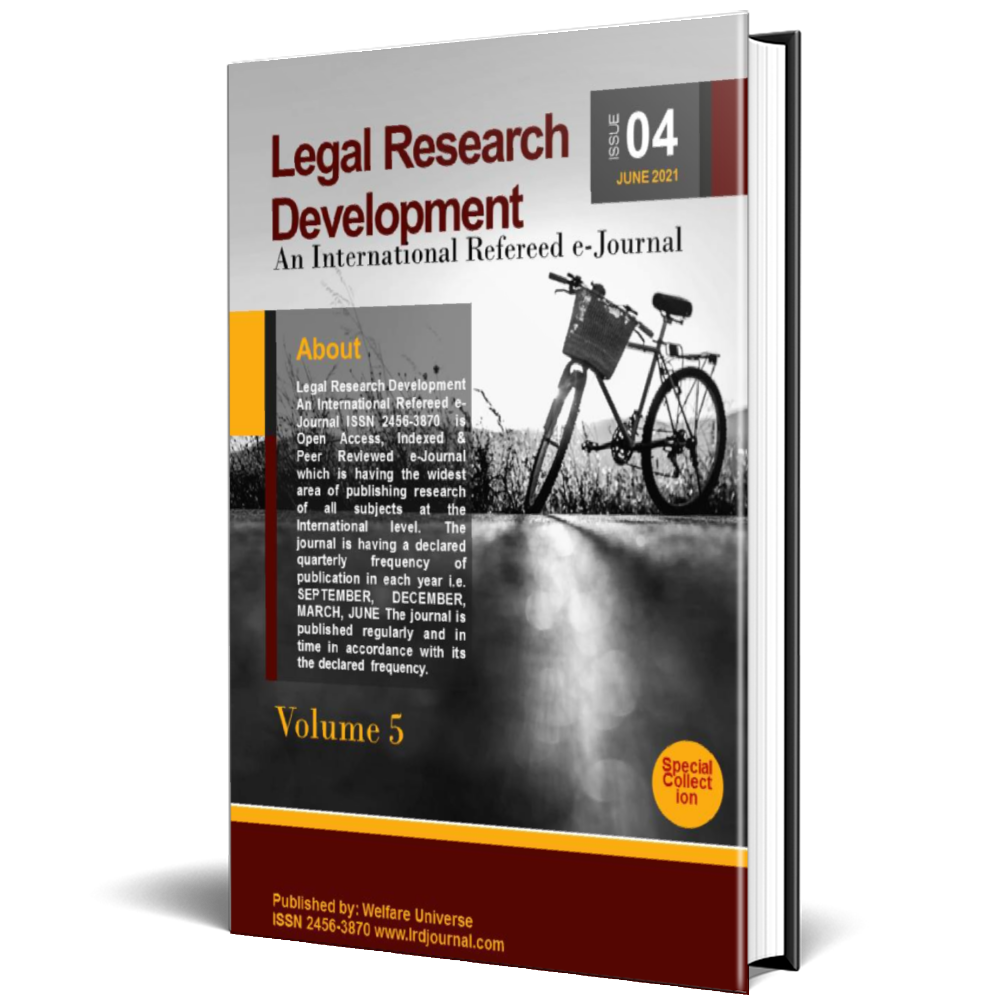The Special Marriage Act, 1954: A Critique
DOI:
https://doi.org/10.53724/lrd/v1n2.03Keywords:
Special Marriage act, Marriage LawAbstract
India is a country with divergent cultural gaiety and religious affinity of people living together exhibiting ‘unity in diversity’. Institution of marriage and value oriented family system are signifying features of Indian culture. The Supreme Court stated that every young man or a woman, has a right to marry cannot be accepted in the absolute terms. Having regard to the age and the biological needs, a person may have a right to marry.4 Arranged marriage, (that to,) or intra caste marriage is the generally accepted norm in the Indian society. ‘Love marriage,’ ‘inter caste’5 or ‘inter religious,’ marriage or ‘registered’ / ‘Court marriage’ is generally is a rarity.6 Parents customarily select bride or groom to their children in the same caste or religion. The society eschews those who marry out of their caste or community. Honor killings7 have been reported every year in India.8 Interestingly, from the statistics of the United Nations, one in five cases of honour killing internationally every year are of India.9 On the other hand, there are some NGOs helping the performance of love marriages and extending protection for such love marriages
References
S. Saghir Ahmad J. SC.., Mr. 'X' vs Hospital 'Z' (1998) 8 SCC 296
Ibid.
Dr. Paras Diwan in his 2nd Edition of "Law of Marriage and Divorce" stated at page 75 that in inter-caste and inter-sect marriages in anuloma form a male of superior caste marries a female of inferior caste; and in pratiloma marriage a male of inferior caste marries a female of superior caste. During British Raj, pratiloma marriage came to be considered as invalid and obsolete but anuloma marriage was held valid. Customary inter-caste marriages were held valid. They were performed under Special Marriages Act, 1872 as quoted in Mrs. Valsammapaul Etc v. Cochin University And Ors. Etc AIR 1996 SC 1011
See ‘Just 5% of Indian marriages are inter-caste: survey’ the Hindu, November 13, 2014 available at http://www.thehindu.com/data/just-5-per-cent-of-indian-marriages-are-intercaste/article6591502.ece
Markandey Katju J., SC., in Arumugham Servai v. State of Tamil Nadu AIR 2011 SC 1859 has criticized the Khap panchayats
(known as katta panchayats in Tamil Nadu) decreeing ‘honour killings’ and other atrocities against girls and boys for inter caste marriages. The Apex Court observed: “We sometimes hear of `honour' killings of such persons who undergo inter- caste or inter-religious marriage of their own free will. There is nothing honourable in such killings, and in fact they are nothing but barbaric and shameful acts of murder committed by brutal, feudal minded persons who deserve harsh punishment. Only in this way can we stamp out such acts of barbarism".
Read Nupur Basu, ‘Honour killings: India's crying shame,’ available at http://www.aljazeera.com/indepth/opinion/2013/11/honour- killings-india-crying-shame-20131127105910392176.html
Ibid.
A Delhi-based NGO Love Commandos have come to the rescue of many such couples. See ‘Here comes Love Commandos: NGO provides couples with shelter,’ available at http://www.hindustantimes.com/india/here-comes-love-commandos-ngo-provides-couples- with-shelter-help/story-iaMhjS6S5JphoDavQMnDfP.html and www.bbc.com/news/magazine-1828099
Ibid.
Usha M, Apte in her book "The Sacrament of Marriage in Hindu Society from Vedic period to Dharmsastras" (1978 Ed.) page 13 as quoted by K. Ramaswamy J., SC., in Mrs.Valsamma Paul v. Cochin University and Ors,AIR 1996 SC 1011
Mrs.Valsamma Paul v. Cochin University and Ors, AIR 1996 SC 1011
Section 4 of the Special Marriage Act, permits a marriage between two persons of different faiths. Therefore, a Hindu can marry a Christian under the Special Marriage Act- see Robin v. Jasbir Kaur judgment delivered by Punjab & Haryana High Court on 3 June, 2016, available at http://phhc.gov.in/download_file.php?auth=Li9wZGYvZm8vQ1JNLU1fMjU3ODBfMjAxNV8wM18wNl8yMDE2X0ZJTkFMX09SR EVSLnBkZg== and https://indiankanoon.org/doc/27367589/
The caste system is a curse on the nation and the sooner it is destroyed the better. In fact, it is dividing the nation at a time when we have to be united to face the challenges before the nation unitedly. Hence, inter-caste marriages are in fact in the national interest as they will result in destroying the caste system.- Markandeya Katju, J.,SC., Lata Singh v. State of UP AIR 2006 SC 2522
See Smt. Seema v. Ashwani Kumar AIR 2006 S.C 1158 and Bhabani Prasad Jena Etc. v. Convenor Secretary, Orissa State Commission For women & Anr AIR 2010 SC 2851.
Rajesh Burmann v. Mitul Chatterjee AIR 2009 SC 651
M/S Shabnam Hashmi v. Union of India & Ors,(2014) 4 SCC 1
‘It's a boost for secular, simple marriages,’ Times of India. Bangalore, June, 20, 2016
Ibid.
Ibid.
Special Marriage Act, 1954, Chapter I, Section 1 (2) – “It extends to the whole of India except the State of Jammu and Kashmir, and applies also to citizens of India domiciled in the territories to which this Act extends who are [in the State of Jammu and Kashmir].
See also Dr. Divya Chansoriya, ‘Law Of Special Marriage Act “1954” In India,’ available at
ijierm.co.in/index.php/IJIERM/article/view/137/145
Section 22 of the Special Marriage Act, 1954, see Delhi High Court Dalip Kumar Atal vs State (Nct Of Delhi) & Anr decided by Delhi High Court on 4 August, 2016 available at https://indiankanoon.org/doc/93757959/in the instant case, there has been withdrawal of petitions under Section 22 and the FIR lodged against the appellant under Sections 498A, 498-A/406/34 IPC and Section 4 of Dowry Prohibition Act were permitted by the Court pursuant to a compromise.
Robin v Jasbir Kaur decided by Punjab& Haryana High court on 3rd June, 2016 available at https://indiankanoon.org/doc/27367589/
Ibid.
Krishnadas v. State of Kerala WP(C).No. 23081 of 2016 (I) Kerala High Court available at https://indiankanoon.org/doc/27570184/
See Section 4 of The Special Marriage Act, 1954
Arijit Pasayat, J., in Smt. Seema v. Ashwani Kumar AIR 2006 S C 1158. The Court also has noted that the Convention on the Elimination of All Forms of Discrimination Against Women (in short 'CEDAW') was adopted in 1979 by the United Nations General Assembly. India was a signatory to the Convention on 30th July, 1980 and ratified on 9th July, 1993 with two Declaratory Statements and one Reservation. Article 16(2) of the Convention says "though India agreed on principle that compulsory registration of marriages is highly desirable, it was said as follows: "'It is not practical in a vast country like India with its variety of customs, religions and level of literacy' and has expressed reservation to this very clause to make registration of marriage compulsory".
The Convention on the Elimination of All Forms of Discrimination Against Women (in short 'CEDAW') was adopted in 1979 by the United Nations General Assembly. India was a signatory to the Convention on 30th July, 1980 and ratified on 9th July, 1993 with two Declaratory Statements and one Reservation. Article 16(2) of the Convention says "though India agreed on principle that compulsory registration of marriages is highly desirable, it was said as follows:
"'It is not practical in a vast country like India with its variety of customs, religions and level of literacy' and has expressed reservation to this very clause to make registration of marriage compulsory"
Markandeya Katju, J.,SC., Lata Singh v. State of UP AIR 2006 SC 2522
Section 4(d) of the Special Marriage Act,1954
Laws of Civil Marriages in India– A Proposal to Resolve Certain Conflicts, Report 212, October 2008, Chapter IV -Prohibited degrees.
See Section 5(V) of Hindu marriage act, 1955. “Saha pinda bandhavya nishedhaha”
Laws of Civil Marriages in India – A Proposal to Resolve Certain Conflicts, Report 212, October 2008, Chapter IV –Prohibited degrees.
There has been criticism about the age discrimination and the girls of teen age are being victimized due to the same. There shall be change of law in the age especially the age of female shall also be equated to male so that girls get maturity in understanding better at that age which would also avoid them innocently falling prey due to the teen age innocence influenced by some immature unstable actions.
AIR 2010 SC 1915
A pre marriage ceremony among Sikh community in Punjab.
(11) SCC 768
2008 (17) SCC 602
Smt. Rachna Chohan vs State of Madhya Pradesh available at mphc.gov.in/upload/gwalior/.../MCRC_7900_2015_FinalOrder_12- Aug-2015.pdf
AIR 2014 SC 187
AIR 1982 SC 1261
Brijesh Kumar, J. SC., Jaya Lakshmi Coelho v. Oswald Joseph Coelho (2001) 4 SCC 181
C.K. Thakker, J., SC., Rajesh Burmann v. Mitul Chatterjee , 2008 (14) SCALE 372
See Mr Michael Gerard Ferris v. Mrs Svetlana Alexandrovna, case decided by Justice S.Abdul Nazeer, Karnataka High Court on 14 July, 2016, available at judgmenthck.kar.nic.in/judgments/.../1/CRLRP411-13-27-05-2013.pdf
Asad Ali, ‘The battle for Love and the Special Marriage Act,’ Hindustan Times. “This is only to ensure a window of natural justice,” says Shukla. He adds, “If either party concerned is already married and trying to suppress such information, then any third-party has that time to raise an objection to the marriage. If any objection at all is raised to the marriage within that period, the marriage officer will consider all aspects of the case before allowing the marriage to be solemnised.” For details- http://www.hindustantimes.com/brunch/the-battle-for-love-and-the-special-marriage-act/story- 28uQ3vGKkH0UrVAaKaHCrI.html.
In the High Court of Delhi, WP(C) No.748 of 2009, available at https://indiankanoon.org/doc/26886784/
Govind v. State of MP, (1975) 2 SCC 148, and R. Rajgopal v. State of T.N. (1994) 6 SCC 632, District Registrar and Collector v. Canara Bank (2005) 1 SCC 496.
(2014) 5 SCC 678
AIR 1965 SC 1954
(2) GCD 1463 (Gujarat)
‘ S.LP No. 18889 / 2012 , see also Supreme Court to Review Gujarat High Court’s controversial decision: Goolrukh Gupta Case,’ available at http://parsikhabar.net/issues/supreme-court-to-review-gujarat-high-courts-controversial-decision-goolrukh-gupta- case/6799/#.V76GXBLtZ_l ‘“Deemed conversion” of woman’s religion upon marriage; Supreme Court approached against Gujarat High Court’s controversial decision’ available at http://barandbench.com/deemed-conversion-womans-religion-upon-marriage supreme-court-approached-against/
Impleadment Application Goolrukh Gupta, Mrs.Goolrokh M. Gupta v. Mr. Burjor Pardiwala and Ors, 2012(2) GCD 1463 (Gujarat)
(1976) Supp SCR 478
Downloads
Published
How to Cite
Issue
Section
License
Copyright (c) 2016 Legal Research Development: An International Refereed e-Journal ISSN: 2456-3870

This work is licensed under a Creative Commons Attribution-NonCommercial 4.0 International License.










